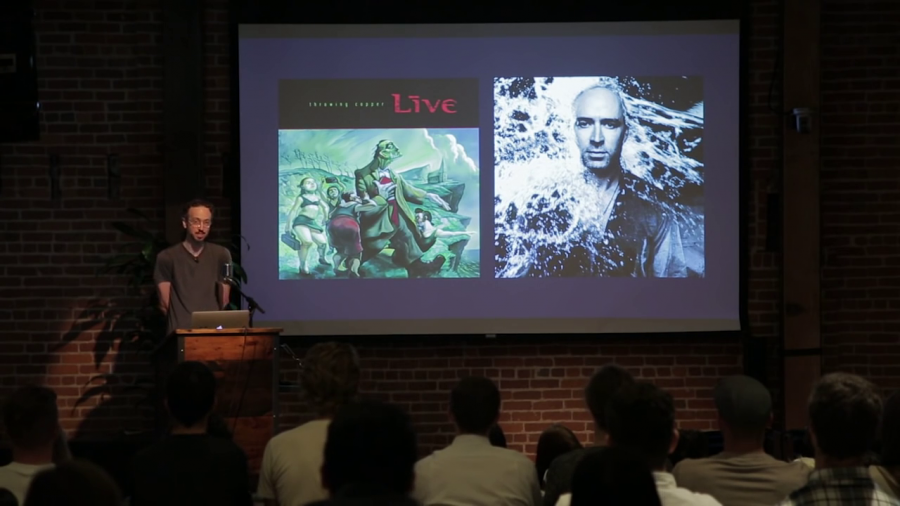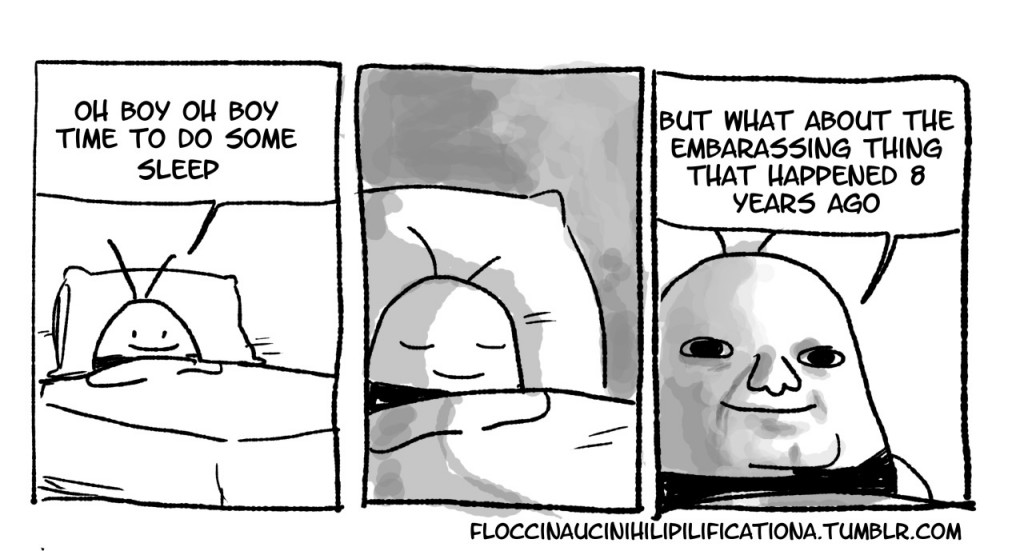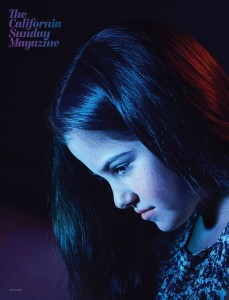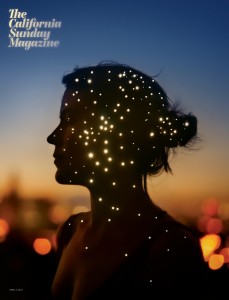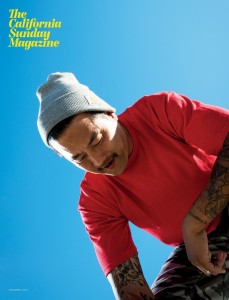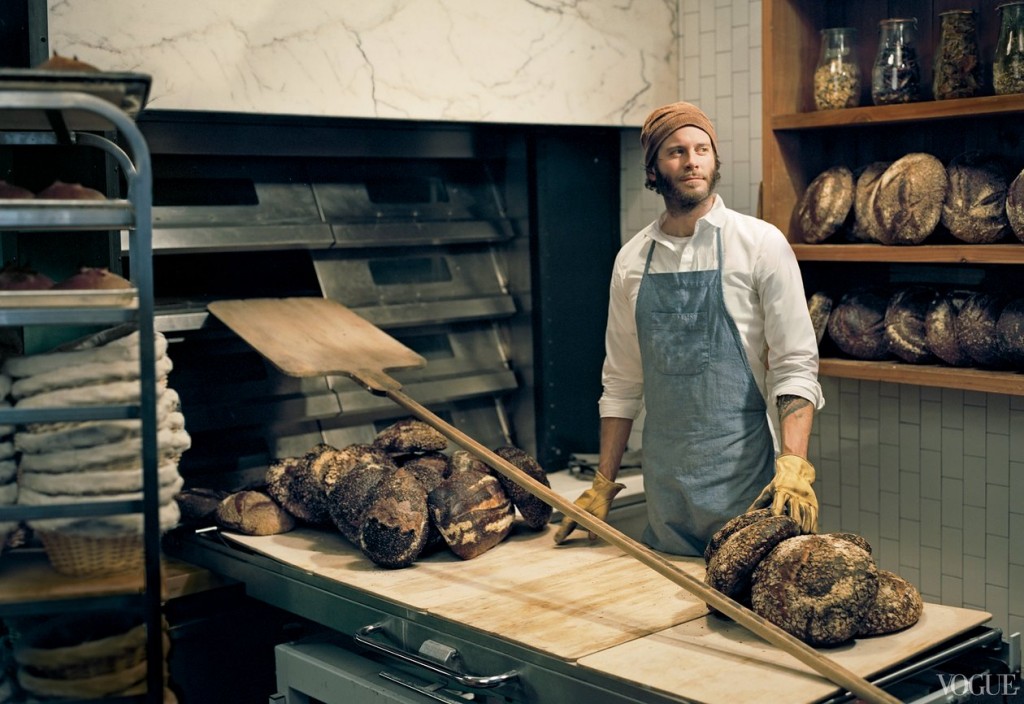Hi.
Okay. This happened to me recently. I’m in bed. I’m ready to go to sleep. It’s been a long day. I’m tired. And all of a sudden, my brain decides this is the perfect time to remember that really embarrassing thing that happened years ago.
For me it was actually twenty years ago. And then I’m up all night, tossing and turning, reliving the whole embarrassing experience, over and over again…
To make it worse, now I’m going to stand up in front of all of you, and tell you that embarrassing thing that happened to me twenty years ago, so this is going to be fun. You ready?
I talk of freedom, you talk of the flag.
I talk of revolution, you’d much rather brag.
And as the decibels of this disenchanting discourse
continue to dampen the day, the coin flips again
and again, and again, and again as our sanity walks away.
This is an excerpt from something I submitted to my junior high poetry magazine when I was in the 8th grade. Now, anybody has a right to be embarrassed by their own 8th-grade poetry. But that’s not the really bad part.
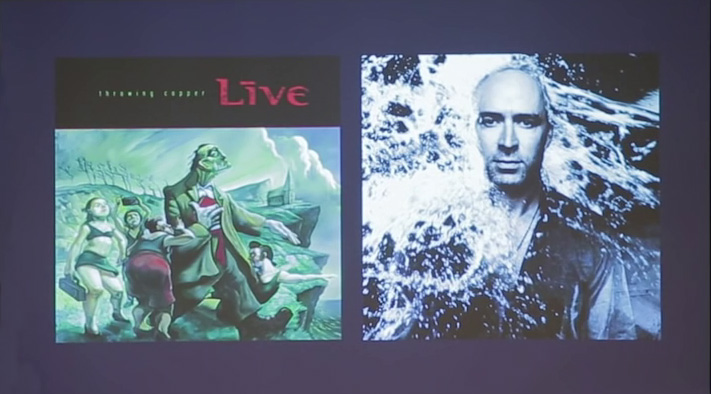
Because the truth is I didn’t write this. This guy did. And he recorded it on this multi-platinum album, which came out in 1994, the same year I tried to pass it off as something I wrote. I’m just lucky that the judges reviewing the submissions were high school students, so they recognized the song because it was on MTV. If it had been teachers they might not have noticed and then it just would’ve been printed and mailed to hundreds of people’s homes and been there forever. My permanent shame.
Why did I do it? Seriously. When they dragged me in to explain myself, the only answer I had, after the same answer that any 13 year-old has when you ask them why they did something wrong: “Iunno.” The only explanation I could come up with was that I wanted to have written something like that so much that I convinced myself that I had.
This was obviously a terrible excuse, and a really really stupid thing to do. But I think I remember that experience so vividly not just because it was horrifyingly embarrassing, but because something about that excuse was true. That really was how I felt sometimes. When you’re 13 years old and you hear a song for the first time, and you feel like you’re the first person in the world to get it, that song, any song, and you’re sure if you had just been able to articulate how you were feeling, before you heard that song, surely you would’ve written it just like that.
And every one of them words rang true
And glowed like burning coal
Pouring off of every page
Like it was written in my soul from me to you
Bob Dylan, “Tangled Up in Blue”
I learned the guitar in high school so I could play those songs. And I listened to them over and over again. I wrote my own songs that I tried to make sound just like them. Music became something that I loved so much that I didn’t want to just listen to it. I wanted to absorb it. I wanted to crawl inside those songs and live there.
Okay, why am I telling you this? I’m actually starting to wonder.
But what does this have to do with our theme today, collaboration? I want to talk about collaboration, but I also want to talk about its awkward cousin, appropriation.
Appropriation is a fancy word for “copying,” but it’s more complicated than that. When I appropriate something you made, I take it and I make it my own. I can do that by literally just taking it for my own benefit or taking credit for it like I did with the song lyrics. Or I can do it by transforming it and using it to create something new.
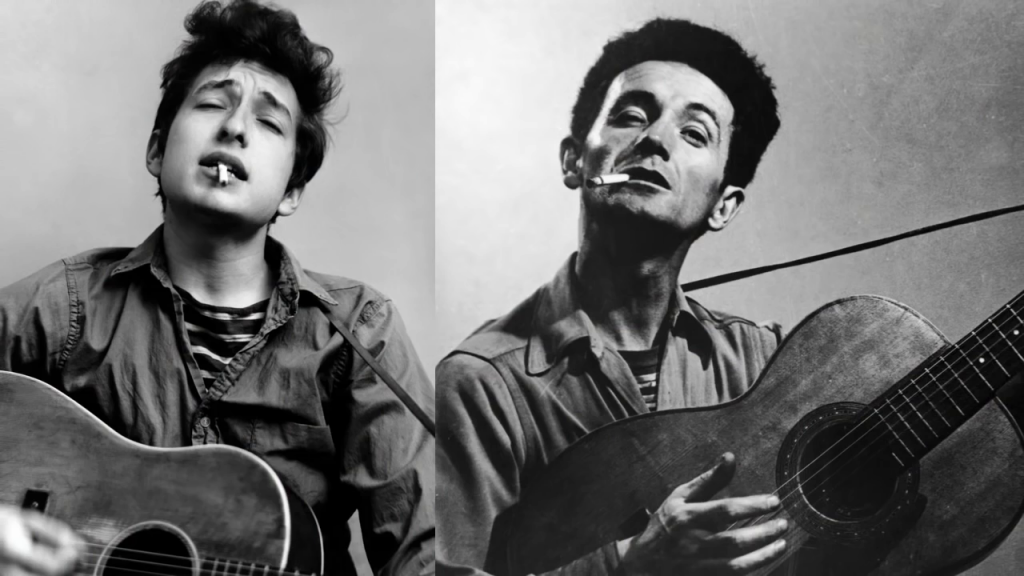
Photos: Getty Images, Michael Ochs archives
One of my favorite artists in the world is Bob Dylan, who wrote so many of those songs that I wished I could’ve written. But he was also one of the world’s most shameless masters of appropriation. That’s Dylan, and that’s Woody Guthrie. In the beginning, Dylan copied everything from Woody. His style, his sound, his songs, and even the way he talked. But then he just kept going, on and on, to something new and strange and different. And he never stopped appropriating new influences along the way. Bob Dylan became a legend in his own right, but he never really outran the critics who said that he was just a thief all along.
Music, art and design, most creative industries have a pretty uncomfortable relationship with appropriation. And it’s worse when everything’s online. It’s so trivial to copy something or just take credit for it. It can be really scary to make something and put it out there.
![Comic: Anthony Clark, "The Internet"; [rotated for space here; I made this.]](http://opentranscripts.org/wp-content/uploads/2015/11/i-made-this.jpg)
Comic: Anthony Clark, “The Internet” [rotated for space here; I made this.]
This is what appropriation looks like online. It’s immediate! It’s unnerving. So appropriation is something we’re really uncomfortable with. We talk about it mostly in negative terms, when we even talk about it at all. But it’s also weirdly a pretty fundamental part of how we work. Sharing ideas and building on other people’s solutions are just basic parts of how we work together. In a lot of ways, we need appropriation for collaboration to exist. And I think when we only talk about the darker side of appropriation, when we make it something to hide or something to be ashamed of, I think we’re actually making it harder to work together.
Okay. Fast forward from my middle school disaster. Let’s go about ten years or so, the first time I came to California. I flew out to San Francisco to interview for a job at Apple, which I was very excited about and not remotely qualified for. I’d somehow faked my way through the phone screen, and I think at some point the manager must have just decided, “Ah, what the hell. Just give him a shot,” because after they flew me out and I fumbled my way through 8+ hours of in-person interviews, it was abundantly clear to everyone, myself included, that there was no possible way I could even pretend to do the job.
But I got lucky. I got a second chance. Because after they sent me back home, the manager passed my name on to another manager in another part of Apple, on the team that designed the web site. And eventually I made it back to interview for a job that I actually had a hope of getting. And I did.
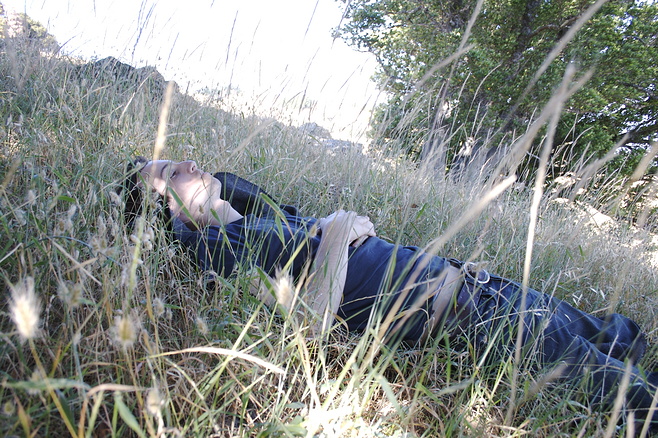
Photo: Laura Brunow Miner, “Untitled”
This is me right after we moved to California, hopefully not thinking about plagiarized song lyrics. When I moved out here to start working at Apple, I had the most incredible case of impostor syndrome. For the first few weeks, I practically hid everything that I was working on. I was terrified that after that whole first experience that I was going to be found out any second and exposed as a fraud and they were going to send me back to Kansas.
Before, when I was stuck working on a design project, I would always look at what Apple was doing. Maybe you get some ideas, copy a few things. I remember thinking “I work here. Now what am I supposed to do?” It took me a while before I figured out the answer, which was basically keep doing the same thing. Except now it wasn’t called copying, it was called “staying on brand.”
So instead of hiding everything that I was working on, I started to share everything. Not just perfect, defensible, finished work, but the really rough and broken and messy stuff. Problems I couldn’t even get my head around yet. And we copied each other shamelessly. Literally we never even thought to be ashamed of it. I spent as much time standing over other people’s shoulders as I did working at my own computer. If somebody came up with something I could use, I used it. Nobody’s name ever went on anything. Nobody ever talked about credit; there was no reason to. It was all “Designed by Apple in California” at the end of the day anyway.
So much work had already gone into everything by the time we got our hands on it, what a triumph of ego it would be for us at the end of the line to start marking our territory. We were just trying not to screw it up. Somebody trusted us to do this job, so we trusted each other.
I learned so much that first year at Apple. The deadlines were insane, but it was an amazing experience. But the thing that still sticks with me ten years later is that example of the kind of work you could do in a group of people who trust each other. It’s really hard to believe that was ten years ago. Do you remember the first time you came to California? Maybe it wasn’t that long ago. Maybe you were born here and this isn’t going to make much sense to you, but I’m from Kansas. California is different. San Francisco is different. Coming here for the first time felt like stepping through a portal to an alternate universe. I mean, it gets weird here sometimes, and so many people who want to be here for so many different reasons, it can get claustrophobic, and expensive. But I feel so lucky to be able to live here. To work here. And to be part of this incredible community of creative people in this magical, surreal place.
I work for a magazine now. It’s called The California Sunday Magazine. It’s a pretty new magazine. This is what some of the print covers look like. It’s really beautiful. You should buy a subscription today. Talking about taking credit for other people’s work, just putting these covers on here. Leo [Jung] our creative director, and Jacqui [Bates] is the photo director, who were responsible for these looking as beautiful as they are are here today. So please, direct your accolades towards them.
The magazine publishes these beautiful stories, all connected somehow to California and the West. But it’s not just about the place, it’s sort of about all the ideas and values that we associate with California. And it is such a talented group of people who are making it. I’m not including myself in that statement yet, I’ve only had this job for a few months. But I feel like an impostor all over again. It’s fantastic. I’m still hovering over people’s shoulders and borrowing ideas whenever I get the chance. Maybe people are waiting for me to settle in and start leaving them alone but…sorry.
I’ve been really lucky over the years to work with some really amazing people, and I’ve learned so much from them. But here we all are, together in this room. 300, maybe, super talented creative people. Very few of us in this room will ever get a chance to work together. Most of us never will. Think about how many places you’ve worked in your career so far. How many places do you think you’ll work in your lifetime? How many chances will you have to learn, share, and grow like that? To elevate your game. To be inspired. To collaborate. Why do we limit that to people we work with at a company? Why aren’t we always putting our work out in the open like that? Sharing with each other. Helping each other.
Because it’s scary. Because I don’t trust you. We’re all afraid of the worst in ourselves and each other, and it’s very real. I’m not going to try to say that it’s not. But I think we get something wrong about trust. We think it’s earned. I do this all the time. I hold back trusting other people until they’ve earned it.
But some of the most rewarding experiences in my life have come from the moments when I decided, against all the very real worst-case scenarios, to reverse that order of operations. The times I decided to trust first, ask questions later. I’ll be honest, it hasn’t always worked out. But when it does, it’s kinda spectacular. In a way, I’m giving this talk and telling you all these embarrassing things as a reminder to myself to take that risk more often. That’s something I love about California, about this creative community. It feels like sharing and collaboration are part of the ideas and values of this place. Like trust is the default state.
There’s this quote I love from an interview with Chad Robertson, who started Tartine Bakery. Tartine is kind of a legend in San Francisco, and Chad is sort of a bread rock star. I mean, look at him. But he’s also developed a reputation for interesting collaborations with other restaurants. In this interview he’s talking about collaboration in the baking scene, which in case you’re wondering is totally a real thing. He said this:
I share information, and information is shared with me. People don’t shut me out because I don’t take credit for other people’s shit. […] There is mutual respect. We don’t copy one another so much as we are inspired by one another. There are no secrets. It’s just bread.
Chad Robertson, “Tartine’s Chad Robertson Plans to Take Over the World”
To me that just gets at the heart of it. Mutual respect, no secrets, don’t steal other people’s shit. It’s just bread.
So look around the room. Look at the people sitting next to you. (Come on, actually do it.) What would you learn from each other if you had a chance to work together? What would you share with everyone in this room, if you knew you could trust them? What if you just did it anyway?
Thanks.
Further Reference
Event page for this talk at the Creative Mornings site.
Dylan Paintings Draw Scrutiny, on accusations of plagiarism regarding some of Bob Dylan’s paintings.
